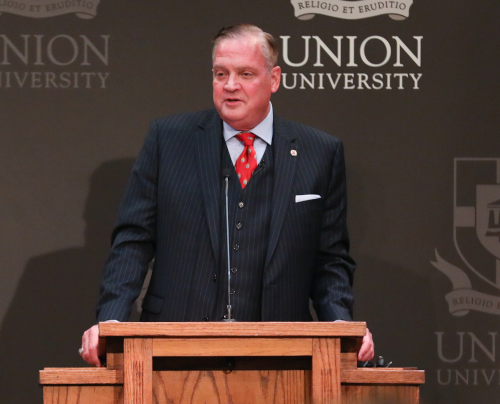JACKSON, Tenn. — March 18, 2021 — The right to religious liberty is central to Baptist identity and conflicts with the modern view of rights without basis in truth, R. Albert Mohler Jr. said at the fifth annual David and Lanese Dockery Lectures on Baptist Thought and Heritage March 16 at Union University.
Mohler, president of Southern Baptist Theological Seminary and the Evangelical Theological Society, delivered two lectures on the topic “Religious Liberty and Contemporary Baptist Thought” in the Grant Events Center.
After an introduction and prayer by Ray Van Neste, dean of Union’s School of Theology and Missions, Mohler began his first lecture, entitled “Religious Liberty and the Imago Dei: Why Recognize Any Liberty?” by delving into the history of rights talk. He discussed the 1948 Universal Declaration of Human Rights and Franklin Roosevelt’s Four Freedoms as examples of modern visions of human rights without metaphysical rationale.
“The problem ... is that most of the conversation about human rights and liberties offers no grounding whatsoever, no metaphysical grounding, no ontological grounding,” Mohler said. “It’s simply a moral assertion, and one of the things we need to recognize ... is that moral assertions apart from ontological reality don’t last long.”
Mohler discussed the shift from conceptions of rights grounded in the idea of human dignity by creation in the image of God to rights talk centered on pre-political natural rights and finally, during the last century, to the idea of explicitly political rights. These new rights are not added to the old rights but rather push them away, Mohler said.
Mohler presented several theses on how Christians should understand human dignity and rights, arguing that all human beings have rights as a gift from God defined by him. These rights are based on creation in the image of God and are thus pre-political, but the government should affirm them. Central to these rights is the affirmation of “the dignity of life as divine gift.”
“Such rights will survive only if they are sufficiently acknowledged as gifts of the divine creator,” Mohler said.
However, Mohler said, few arguments are being made today in support of the classical view of rights. As a group whose identity includes the right to religious freedom due to theological understanding and experience with persecution, Mohler called on Baptists to “recognize that religious liberty is at the front line” of today’s crisis of the theory of rights.
“Baptists both have been and must be the first-line defenders of religious liberty,” Mohler said.
Mohler said that Christians should hold to a view of rights grounded in the biblical theology of humanity as bearers of God’s image whose souls belong to him and not to the Caesars of the world. He also examined historical understandings of rights prior to modernity’s secular vision of humans as having no rights beyond those bestowed by the government.
Mohler said the central conflict is between the classical view of human rights arising from human dignity and the modern view of rights that do not exist pre-politically.
“We have no reason to expect that religious liberty will be long respected by a secularizing society,” Mohler said.
Mohler’s second lecture was entitled “Religious Liberty and the Looming Crisis: So, Which ‘Liberty’ Shall Prevail?” Both are available for viewing in their entirety at livestream.com/uu/campusevents.

